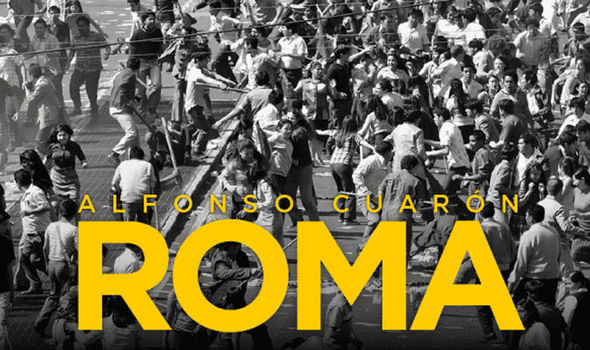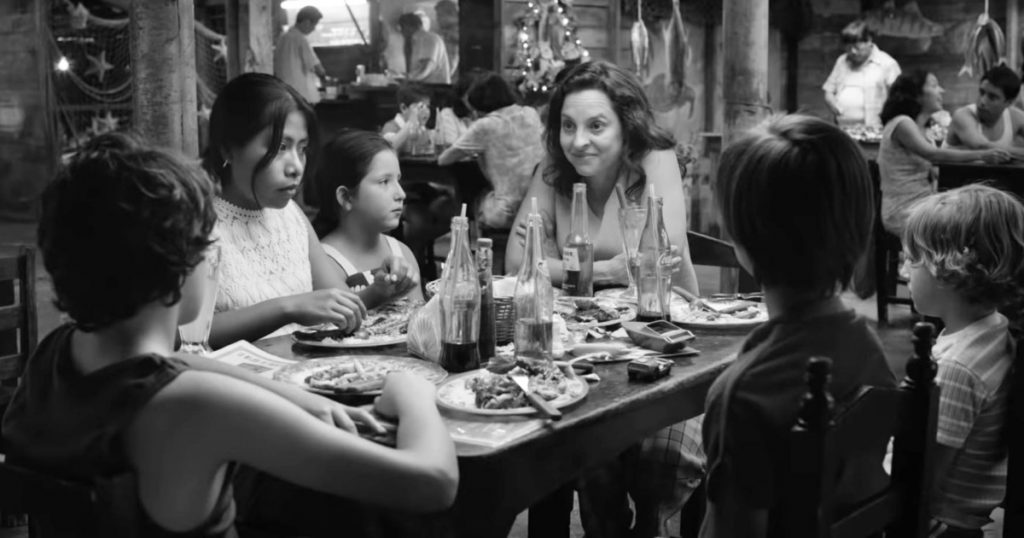Ever so lovely is the black-and-white cinematic pageantry of Roma. Each scene is a perfection of framing, an assemblage of darkness and light, a ballet of sinuous movement, a celebration of emotions and life. Throughout, the movie is a graceful, balanced homage to simple human existence, the lesser threads of happenings around us that we either ignore or choose not to acknowledge.
 Central to Roma is Cleo, the live-in housekeeper and child-minder for a lively family thriving in 1970s Mexico City. The businessman husband is rarely present, leaving quiet Cleo and her friend and fellow housekeeper/cook Adela to assist the elegant, harried wife Sofia and her bustling brood of four. In their spacious home, sandwiched into mid-city blocks like the brownstones of Manhattan, daily life is privileged, cluttered, discombobulated and ever-moving, a vivid reel of family scenes. The wife is fraught, the husband distant and disconnected, the children sprightly and indefatigable, placing Cleo as a central balancing force holding it all together.
Central to Roma is Cleo, the live-in housekeeper and child-minder for a lively family thriving in 1970s Mexico City. The businessman husband is rarely present, leaving quiet Cleo and her friend and fellow housekeeper/cook Adela to assist the elegant, harried wife Sofia and her bustling brood of four. In their spacious home, sandwiched into mid-city blocks like the brownstones of Manhattan, daily life is privileged, cluttered, discombobulated and ever-moving, a vivid reel of family scenes. The wife is fraught, the husband distant and disconnected, the children sprightly and indefatigable, placing Cleo as a central balancing force holding it all together.
If you dare to dip into this carefully-revealed tale, be wary of the deeper meanings threaded beneath every scene. Water, dogs, airplanes, automobiles, flickering candles and parades are symbolic. Stories are unfurled with flair and magic, each character adding drama that expands into sheer visual delights and heart-crushing horrors. Also, keep an eye out for hidden humor tucked into every corner: the intensity of a crowd interrupted by a “Wes Pont” sweatshirt, ducks mating amid a serious scene, the errant shouts of a vendor in the background of a focused montage. These are the cracklings of reality that make this movie a masterpiece.
Pay particular attention to happenings around the main story. Whether unfocused images, children singing, muted neighborhood noises, or weighted backdrop dialogue, every millisecond of film adds to its poignance and beauty. Take the opening credits — the water, the rhythm, the reflections — all of which come together in a significant later scene. Or, at the very start of the film, the meticulously arranged still-life through which Cleo strides, with bicycles, birdcages, a door frame, a staircase. An artist’s hand is at work at every turn, heightening the viewer’s pleasure throughout the movie.

Amid this gorgeous and ambitious film are, however, a few caveats for viewers less accustomed to “artsy” foreign films. An astounding martial arts demonstration in full-frontal male nudity is nonetheless far more admirable than shocking. An unexpected pregnancy is later followed by a grim fetal scene that is equally honest and soul-smashing. Tense and terrifying plot points here and there move the story along nicely as well, but it must be stated that this is not a film for accompaniment by children. Still, shot in shadowy vintage hues, and in Spanish with subtitles, Roma is a fine panacea for the avid moviegoer searching for something above blockbuster fluff, something unique, something that enkindles all of the senses.
And, while the brilliantly photogenic scenery is front and center, the subtle and wrenching individual performances are equally spectacular. Cleo embodies a tempered strength and practicality that is both servile and proud, with eruptions of lyrical whim; whether patiently holding back the family dog Borras, in bed watching her lover, or standing through debilitating physical suffering, her face is a broad, unemotional plane of careful observance. When she smiles, the entire world around her is uplifted in mood and hue; when she breaks, it is truly heartbreaking.
Around Cleo, the children each percolate with mischief and energy; even bouncy, barrier-blind Borras plays a key minor character. Yet, at the end, no one person is done so well as, or is more important than, Sofia, in a purposefully muted performance that captures the essence of a brave mother caught between her love for her children and household help, her honor of her own mother, and her marital commitment. In every word and action she defines hope, defies defeat, embodies courage and personifies grace. Together, Cleo and Sofia are a testament to life: As long as you keep moving forward, it’s all that matters. And women, always, always stand up for each other.
On all levels, this is high cinema encompassing a taut blend of simmering drama and everpresent grace. If you appreciate well-paced, intensely visual foreign works such as Indochine and Perfect Strangers, you will find Roma‘s physique breathtakingly gorgeous, its heart truly human, and its soul perfectly lovely.
Starring: Yalitza Aparizio (Cleo), Marina de Tavira (Sra Sofia), Nancy Garcia Garcia (Adela), Veronica Garcia (Sra Teresa), Andy Cortes (Ignacio), Jorge Antonio Guerrero (Fermin), Jose Manual Guerrero Mendoza (Ramon)
Director: Alfonso Cuarón
Genre: Drama
Rating: R for graphic nudity, some disturbing images, and language.
Run Time: 135 minutes





